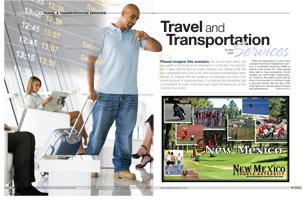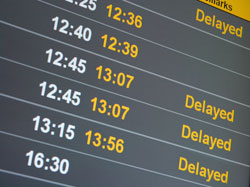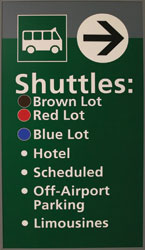
 Please imagine this scenario. You are an event owner and your event is due to go live on television in 15 minutes. The cameras are in place and the fans are ready. However, you receive a call that your participants are stuck at the hotel because transportation never arrived. Or, imagine that your judges or scorekeepers are stuck in an airport because of misconnections. It is amazing that something that is considered so trivial could have such great consequences on the success of an event.
Please imagine this scenario. You are an event owner and your event is due to go live on television in 15 minutes. The cameras are in place and the fans are ready. However, you receive a call that your participants are stuck at the hotel because transportation never arrived. Or, imagine that your judges or scorekeepers are stuck in an airport because of misconnections. It is amazing that something that is considered so trivial could have such great consequences on the success of an event.
When an organization or event owner considers travel and transportation services, it is normally toward the middle to bottom of the priority list. Other agenda items such as venue preparation, on site logistics, etc. tend to take a higher priority. However, this subject covers such an array of services that we will have to take a step back further than the day of the event and cover various aspects of travel and transportation.
Being Prudent with the Travel Dollar
Since events are held not only all over the country but all over the world, travel can be one of the most expensive items in the budget not only for event owners but sports organizations themselves. With the current economic conditions taking its toll, event owners and organizations must be prudent with the travel dollar.
With a fare pricing system that takes a doctorate from Harvard to figure out, how does an organization or event owner ensure that they receive the best value for their dollar? Many have turned to professional travel management companies. These companies employ professional travel consultants that are trained and versed in navigating the travel maze.
The majority of the companies utilize state-of-the-art computer reservation systems that compare numerous fares on not only airlines but railways as well. They are trained to find the most economical way to get from one destination to another. This technology compares different routings, airline combinations, etc. to find the lowest price fare in a particular market.
It is not uncommon for one flight to cost several hundred dollars less than a flight that is a mere one hour earlier or later than another flight. As in the market, it is all about supply and demand and the airlines have sophisticated technology that sets prices as such.
In addition, these travel management companies will take an organization's history and travel patterns and negotiate special contracts with vendors that will provide deep discounts and perks such as club room passes, upgrades and free tickets. These become very important, especially on long haul trips such as cross country or international legs.
 Much thought and planning becomes especially important for organizations that are trying to get athletes to an event in the most economical manner without a marathon flight to do so. There is nothing that drains an athlete more than sitting hours upon end either on an airplane, train, or in an airport or train station.
Much thought and planning becomes especially important for organizations that are trying to get athletes to an event in the most economical manner without a marathon flight to do so. There is nothing that drains an athlete more than sitting hours upon end either on an airplane, train, or in an airport or train station.
Have you ever stopped to think why such athletes or teams have such a superior home record versus a record on the road? This is because travel is both mentally and physically draining. If the athletes do have a lengthy stop over, negotiate with an airline for day passes in their club room. This environment will allow them to relax in a much more comfortable atmosphere than in the main concourse of an airport. This is where an established relationship with an airline vendor pays great dividends.
If at all possible, do not have athletes switch airports in a given city (i.e. Heathrow to Gatwick). Not only is switching airports physically draining, the chances of missing the connecting flight become greater.
Negotiate with the airline for as lenient terms as possible. Again, this is where a relationship with the airline will prove to be prudent. Group prices are important; however lenient name changes and utilization penalties can prove to just as important. It happens frequently where an athlete is injured close to departure and unable to participate. However, if a lenient name change policy is negotiated, the ticket can be used by the replacement athlete. This is very important as nothing eats up a travel budget faster than tickets that go to waste and are unable to be used. The amount of unused tickets currently being held by event owners and sports organizations are currently in the millions of dollars due to stringent terms that the airline imposes.
Transportation to the Event
All of these things now bring us around to the importance of travel and transportation services as it relates to individual events. As great as an event may be, the first thing that will be remembered is the trip to the destination and the arrival; the last thing that will be remembered is the trip back and the departure. In between, it will be how reliable the transportation was to and from the venue.
As it relates to the budget, one of the first things that should be done is to negotiate an event/meeting contract with the major carrier to the city in which the event is being held. This is a contract that will be for a specific time frame and into a specific destination. This contract will allow a percentage to be taken off of the airfare as a discount, saving several thousands of dollars. Also, this will allow the event owner to earn complimentary tickets to be used later. The standard is one free ticket per 40 booked, but airlines will negotiate for one free ticket per 30 or 25 booked. This contract can be used for participants of the event as well as spectators and family members traveling to the city for the event.
Transportation to the Hotel
The next consideration needs to be the arrival pattern of the attendees. Too many of the event owners today consider meet-and-greet services to be an unnecessary expense and expect not only the athletes and participants of the event to find their own way to the hotel, they expect their VIPs to do so as well.
 There is a perception by the participants of the event that things are so much more organized if someone is there to greet them as they arrive in a city and either assist or provide transportation to the hotel. Today, there are housing and travel management companies that will provide meet-and-greet services as part of the overall service package. Also, the contracted ground transportation company can provide these services as part of their overall package. This is especially important for an international event where participants will be coming into not only a new city, but a new country as well. Navigating an airport such as LAX or JFK by themselves can be a daunting task.
There is a perception by the participants of the event that things are so much more organized if someone is there to greet them as they arrive in a city and either assist or provide transportation to the hotel. Today, there are housing and travel management companies that will provide meet-and-greet services as part of the overall service package. Also, the contracted ground transportation company can provide these services as part of their overall package. This is especially important for an international event where participants will be coming into not only a new city, but a new country as well. Navigating an airport such as LAX or JFK by themselves can be a daunting task.
Transportation to the Venue
The final part of the equation is the venue transportation. If at all possible, contract a hotel within walking distance of the venue. However, if this is not possible, ensure that a well thought out transportation plan is formulated. Keep in mind traffic patterns during certain times of the day. Also, consider whether there is another major event happening at the same time as your event. An example is if you have an event at the Honda Center in Anaheim, will your transportation hit the traffic of a Los Angeles Angels game? If so, devise an alternate route and plan for the additional time.
It is a good rule of thumb for transportation to be hitting the venue at least every 15 to 20 minutes. A designated person needs to be in direct contact with the drivers of the buses. This will always give an exact location at any given time. Also, if the transportation has not arrived within five minutes of expected time, direct contact can be made.
Transportation for the Media
A final consideration that needs to be made is media. A separate transportation plan needs to be set up for the media. Normally, they will need to be at the venue early and will be the last to leave as they have deadlines to meet.

